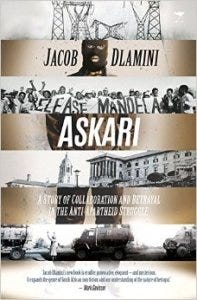Books for the (never-ending) winter
At the end of August, Helanya and I will move to Utrecht, the Netherlands for an eight-month sabbatical. (This time, I'm tagging along.) There are many things to look forward to: a vibrant economic history research group (in Utrecht, but also in many other departments across Holland: Wageningen, Nijmegen, Groningen), fast internet (and no load-shedding), and a biertje en bitterballen at one of the quaint canal cafes.
But there will also be challenges, and none more demanding than the never-ending winter. We leave exactly when the southern hemisphere transforms from winter to summer, and will return when it transforms back again, from summer to winter. In short: we will have 18 months of winter.
So, to keep myself entertained for the year-without-a-summer, I went book shopping. But book shopping presents a dilemma, one, I imagine, that is shared by many book buyers. I really like a printed book (especially a hardcover). It smells and feels great and sits nice and pretty on our bookshelf. And I like the idea of having shelves of unread books; Umberto Eco explains why:
The writer Umberto Eco belongs to that small class of scholars who are encyclopedic, insightful, and nondull. He is the owner of a large personal library (containing thirty thousand books), and separates visitors into two categories: those who react with “Wow! Signore professore dottore Eco, what a library you have! How many of these books have you read?” and the others — a very small minority — who get the point that a private library is not an ego-boosting appendage but a research tool. Read books are far less valuable than unread ones. The library should contain as much of what you do not know as your financial means, mortgage rates, and the currently tight real-estate market allows you to put there. You will accumulate more knowledge and more books as you grow older, and the growing number of unread books on the shelves will look at you menacingly. Indeed, the more you know, the larger the rows of unread books. Let us call this collection of unread books an antilibrary.
But the thing is, a Kindle is just bloody amazing. It fits hundreds of books into a small device that is so user-friendly that it is often better than reading the hardcover. (This is especially true in winter when you want to minimize your contact with the world beyond your duvet.)
So, do I buy the hardcover to sit in my bookshelf, possibly never to be read? Or do I buy it for the Kindle with a higher likelihood of reading it but with no contribution to the antilibrary? #Firstworldproblems Back to the books themselves. Here are my top sixteen picks for the coming cold winter nights: Economics:
Misbehaving - The Making of Behavioral Economics, by Richard H. Thaler [Why we make the often irrational decisions we do]
Capitalist Crusader: Fighting Poverty Through Economic Growth, by Herman Mashaba and Isabella Morris [A mix of South African biography and how-to-fix-South Africa proposals]
Who Gets What - And Why - The New Economics of Matchmaking and Market Design, by Alvin E. Roth [Because, despite what a prominent South African historian might think, understanding game theory is important]
Uncharted - Big Data as a Lens on Human Culture, by Erez Aiden andJean-Baptiste Michel [Big Data is all around us, and exploiting it can make us better]
Why Information Grows: The Evolution of Order, from Atoms to Economies, by César Hidalgo [Economic growth explained by a physicist]
Phishing for Phools: The Economics of Manipulation and Deception, by George A. Akerlof and Robert J. Shiller [Why markets fail, and how to fix it]
Money and Soccer: A Soccernomics Guide, by Stefan Szymanski [Because, soccer]
History:
Political Order and Inequality - Their Foundations and Their Consequences for Human Welfare, by Carles Boix [A new big theory book on how the world is the way it is, this time from political science]
Cotton: The Fabric That Made the Modern World, by Giorgio Riello [World history through the lens of a plant]
Why Did Europe Conquer the World?, by Philip T. Hoffman [More guns, germs and steel]
The Rich: From Slaves to Super-Yachts: A 2,000-Year History, by John Kampfner [If you can't beat them, join them. And if you can't join then, read about them]
Revolutions Without Borders - The Call to Liberty in the Atlantic World, by Janet Polasky [What inspires people to protest?]
Askari - A Story Of Collaboration And Betrayal In The Anti-Apartheid Struggle, by Jacob Dlamini [History is never black and white]
Okay, fiction can be fun too:
All Our Names, by Dinaw Mengestu
A Man Of Good Hope, by Jonny Steinberg [Granted, more biography than fiction]
The Fisherman, by Chigozie Obioma
*Image source: Photo by Darwin Vegher on Unsplash.




